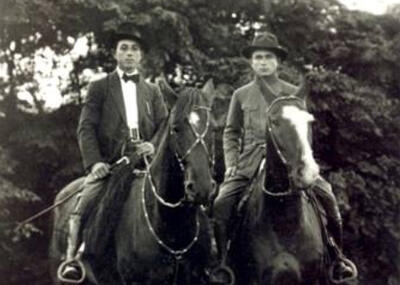The Jewish Gauchos
Alberto Gerchunoff
1910
Thirteen. Lamentations
Weep and wail, O daughters of Zion!
The women were meeting in Don Moisés’ house to recite the lamentations required by ritual. These were the days set aside to recall the loss of Jerusalem, and Don Moisés’ house was one of the most respectable in Rajíl. The colony had a sad, mournful air these days, and the significance of…
Like the Haggadah, Los Gauchos Judíos recounts a story of liberation: from the cruelty Jews lived under in tsarist Russia to the freedom Argentina afforded them. Using short vignettes to introduce Jewish customs and religion to a wider audience (some stories had appeared in Spanish in a daily newspaper), Gerchunoff suggests that the freedom available in Argentina does not come at the expense of tradition. In the story, the older generation clings to deeply felt religious practice, as Jacob and Rebecca’s budding romance suggests a hopeful future under the pampas’ skies. Gerchunoff hints at Argentina’s potential to be the promised land.
What purpose does the description of Moisés play in Gerchunoff’s effort to highlight Argentina’s freedom?
What do you think about the discussion of women praying and “reading with the heart”?
The story ends with the song by “a neighbor” and the prayers about the loss of Jerusalem. Why do you think Gerchunoff chose this juxtaposition?
Creator Bio
Alberto Gerchunoff
The journalist and fiction writer Alberto Gerchunoff was born in Proskurov (now Khmelnytskyi), Ukraine. In 1891, he moved to Argentina, where he lived in the Jewish agricultural colony of Moisés Ville. He later settled in Buenos Aires. Mastering Spanish and deeply drawn to the emerging Argentine civic and cultural life, Gerchunoff worked for the newspaper La Nación for more than forty years and played a central role in Argentine letters. Early in his career, he wrote his immediately famous Spanish-language Gauchos judíos (The Jewish Gauchos of the Pampas), a collection of stories about the lives of Jewish agricultural colonists in the province of Entre Ríos. This was the first great work of literature created about Jewish life in South America. The underlying message of The Jewish Gauchos is one of Jews’ harmonious integration into a new Argentine identity and nature, and indeed Gerchunoff saw himself as a co-creator of the new Argentine culture, rather than a Jewish writer. But the Holocaust and the efforts to create a Jewish state that culminated in the creation of the State of Israel drew him back to active participation in Jewish life.
You may also like

Jewish Gauchos in South America’s Pampas
In the late 19th and early 20th centuries, with the help of philanthropic organizations, many Jews escaping persecution in Russia made new lives for themselves in the South American pampas.


